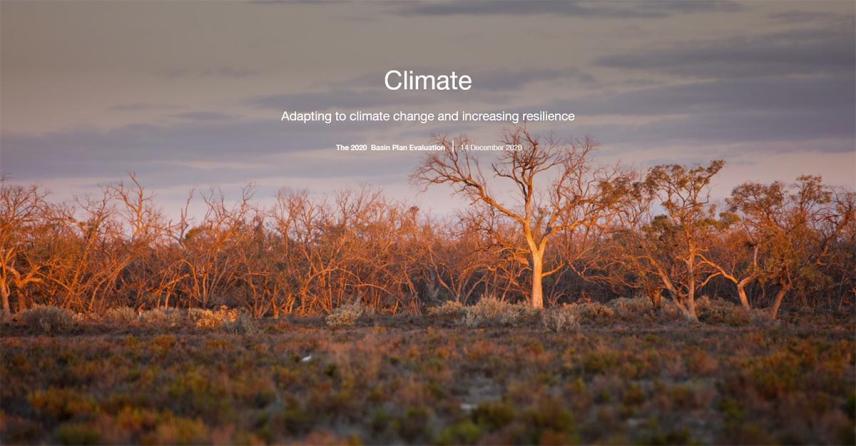A key cross-cutting theme from this Evaluation is the need for all water managers and water users to plan and adapt to the changing climate for the long-term future of the Basin.
As an independent, science-based and evidence-driven organisation, the MDBA draws on the expertise of our highly qualified staff including engineers, hydrologists and environmental scientists.
Their priority is to deliver the Plan in a way that secures the future of this vital river system, and the communities and industries that rely on it.
This is a complex job.
While we can’t accurately predict the future, the MDBA works with many others to produce the best possible plan for the long-term. This draws on around 120 years of data and research including gauge flows, weather, water quality, and changes in landuse and plant and animal communities over time.
Our Story Map provides insights into how the Basin Plan is helping the Basin adapt to the impacts of a changing climate.

Detailed findings from the evaluation
- The Basin’s climate is changing. While the climate has natural variability and is prone to extremes, evidence provided by the CSIRO and Bureau of Meteorology identify the climate of the Basin is changing and the future is likely to be warmer, drier and include more frequent droughts and extreme weather events.
- The first 8 years of Basin Plan’s implementation have tested the policy in extreme climate conditions.
- There have been large-scale floods, resulting in both successful fish breeding and vegetation growth, as well as blackwater events.
- The Basin has just experienced its driest 3-year period on record, which saw record low inflows, towns running out of water, mass fish deaths, extensive bushfires and significant water quality issues.
- The changing climate is a Basin-scale challenge. It will permanently shift the fundamental characteristics and connectivity of the Basin.
Recommendations and commitments for the future
Evaluating the Basin Plan is an opportunity for Basin governments to reflect on the past 8 years.
The 2020 Basin Plan Evaluation considers the changing landscape across the Basin, the effectiveness of the Basin Plan and whether outcomes are being achieved. It’s also an opportunity to determine how we continue to improve the health of the Basin for everyone.
The MDBA has made several recommendations and commitments to improve the management of water resources. The MDBA has made the following recommendations to improve adaptation to changes in the climate and increasing resilience:
- Recommendation 3 – Basin governments should improve sharing of knowledge, tools and innovations that are critical to support climate adaptation and water management. Information and science on future water availability and trends must be shared widely to support businesses, communities and industries plan to be proactive, adapt and diversify.
- Recommendation 4 – Basin governments and the MDBA need to prepare to adapt the Basin Plan in 2026 to incorporate future climate scenarios and trends. This means improving existing tools and developing new frameworks for Basin-scale management. An agreed work program should be established and shared publicly.
- Recommendation 5 – Basin water users, managers, First Nations and community groups need to plan for the future climate. As well as Basin-wide assessment, local climate opportunities and risks should be given attention along with implications, trade-offs and adaptation priorities.
The MDBA has also made a commitment to enhance adaptation and resilience.
Our commitment
The MDBA will facilitate the sharing and coordination of information on Basin climate adaptation. The MDBA will bring water managers together with communities, industries, First Nations and governments to explore strategies. The MDBA will focus effort and investment to improve access to science and evidence for all stakeholders to contribute to enhancing climate resilience and adaptation in the Basin.
Last updated: 17 September 2024